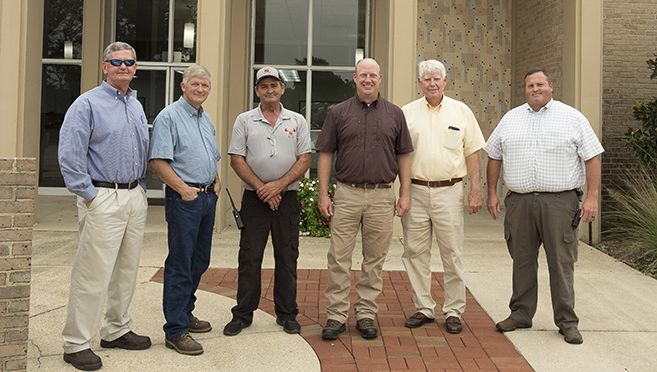
News Staff Report
Escambia was one of three Alabama counties designated as eligible for the Federal Emergency Management Agency’s (FEMA’s) Individual Assistance program under the Major Disaster Declaration signed by President Trump on Monday, September 20, for damage and losses from Hurricane Sally.
The Category 2 hurricane made landfall at Gulf Shores and roared inland, with most of its fury unleashed on Baldwin, Mobile and Escambia counties.
Homeowners and renters who suffered damage from Hurricane Sally in either of those counties should apply to FEMA for federal disaster assistance as soon as possible. Survivors may be eligible to receive assistance for uninsured and underinsured damage and losses, according to a press release from FEMA.
Alabama Lt. Gov. Will Ainsworth and State Sen. Greg Albritton met in Atmore last Friday with Atmore Mayor Jim Staff and Escambia County Commission Chairman Raymond Wiggins to discuss the damage that occurred when the storm blew more than 150 trees onto houses, vehicles, city streets and county roads and brought widespread flooding to a wide area of the county. Also in the meeting were Atmore Fire Chief Ron Peebles and Atmore Police Chief Chuck Brook.
David Adams (director of the county’s emergency management agency), who made several in-person appearances in Atmore to update officials on the damage as the storm raged and phone and internet service were non-existent, told staff the FEMA base of operations had to meet four criteria: wi-fi service, security, tables and chairs, and parking.
Atmore City Hall Auditorium has been tentatively designated as the staging center for financial relief operations.
If an individual has a homeowner’s insurance policy, he or she should file an insurance claim immediately, before applying for federal assistance. The faster the insurance claim is filed, the faster the recovery can begin.
Those with property damage or destruction can register online for federal assistance, at DisasterAssistance.gov, or by phone at 800-621-3362. Persons who are deaf, hard of hearing, or have a speech disability and use a TTY may call 800-462-7585. Multi-lingual operators are available, and lines are open daily from 7 a.m. to 10 p.m.
Those who seek the federal disaster assistance must have the following readily available when filing for the assistance:
*A current phone number where you can be contacted.
*Your address at the time of the disaster and the address where you are now staying.
*Your Social Security number, if available.
*A general list of damages and losses, and
*If insured, the insurance policy number, or the agent and company name.
If you cannot return to your home, or you are unable to live in your home, call or contact FEMA by phone or online to determine what federal, state, local or voluntary agency assistance may be available to you.
If you can return to your home and it is safe, has working power, water, and sewer or septic service, visit DisasterAssistance.gov to determine if state, voluntary and local organizations in your community can address any unmet needs.
Disaster assistance may provide temporary help and a place to stay while you build your own recovery plan. Grants might be available for basic repairs to make your home safe, accessible and secure. FEMA is unable to duplicate insurance payments, but those without insurance, or those who might be underinsured, may still receive help after their insurance claims have been settled.
Long-term, low-interest disaster loans from the U.S. Small Business Administration (SBA) also might be available to cover losses that are not fully insured and that do not duplicate benefits of other agencies or organizations.
Escambia, Baldwin and Mobile counties, as well as the Poarch Band of Creek Indians, were also designated for FEMA’s Public Assistance Program to reimburse local governments for emergency protective measures.
